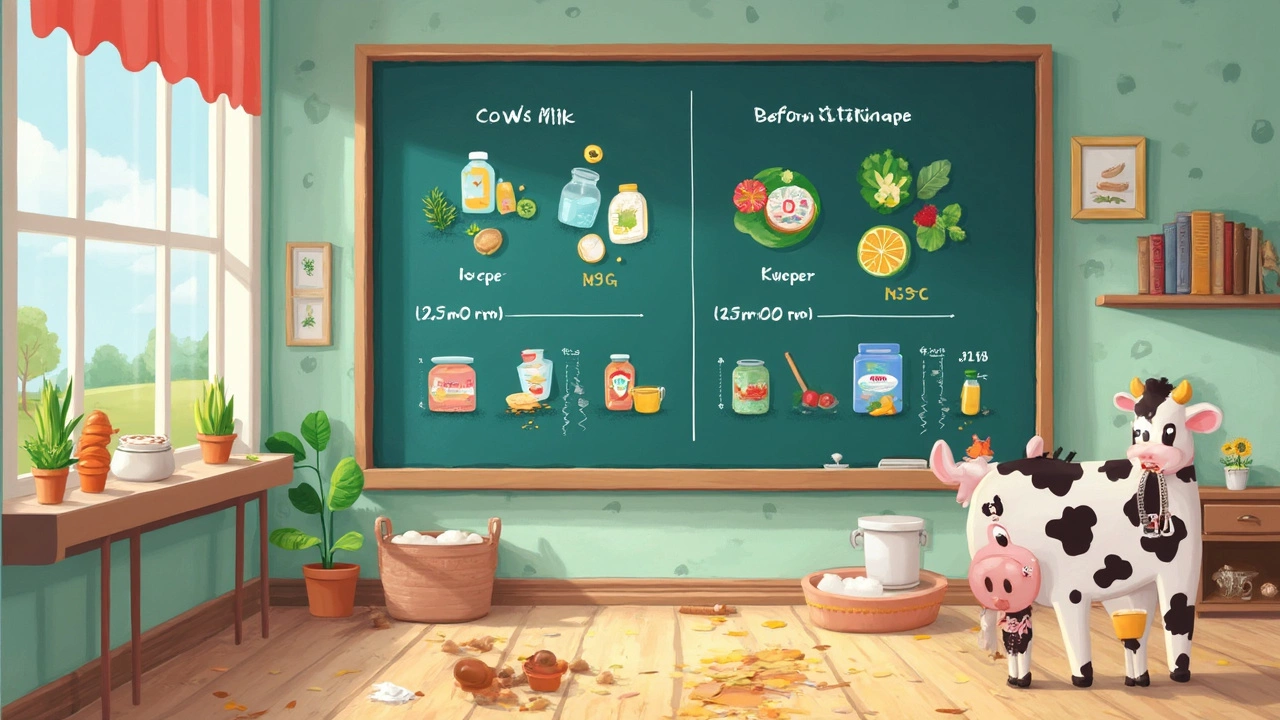
So, you're wondering if it's okay to start giving your little one cow's milk instead of formula. It's a common question, and you're definitely not alone. Let's get into why many experts say it's best to hold off until after their first birthday.
The thing is, cow's milk doesn't offer the same balanced nutrients that infant formulas provide. Babies under a year have specific nutritional needs for growth and development—stuff like iron, vitamin E, and essential fatty acids—where formula or breast milk fits perfectly. Cow's milk, on the other hand, might be tough on their tiny tummies and doesn't have enough of the stuff they need right now.
But don't worry, the transition to regular milk isn't too far off. Once your baby hits the big 1-2 months, you can start integrating cow's milk into their diet, so they can enjoy all the dairy goodness along with solid foods. Just make sure to keep an eye out for any allergies or digestive issues.
- Why Wait Until 12 Months
- Nutritional Needs of Infants
- Transitioning to Cow's Milk
- Alternatives and Tips
Why Wait Until 12 Months
When it comes to feeding an 8-month-old, sticking to breast milk or formula is usually the best bet. You might wonder why. Well, it's all about what's inside cow's milk—or rather, what's missing. Infants at this stage need specific nutrients to grow healthy.
Cow's milk is low in iron, which is super important for developing babies. Iron helps with making red blood cells, and a deficiency can lead to anemia. Formula, on the other hand, is fortified with the right amount of iron your baby needs.
Digestive Considerations
Little tummies aren't ready for cow's milk yet—it's not easily digested compared to breast milk or formula. In fact, it could cause digestive issues and discomfort. The proteins and minerals in cow's milk could even stress their kidneys, which are still maturing.
Nutrition Balance
Breast milk and formula are balanced to offer just the right mix of calories, fats, and proteins. This balance supports your baby's rapid growth phase, something cow's milk can't match at this age. Plus, cow's milk doesn't have the omega-3 fatty acids that are good for brain development.
Recommendations
Both the American Academy of Pediatrics and similar groups worldwide suggest waiting until your little one's first birthday before making the switch to cow's milk. It's all to ensure your baby gets everything needed for healthy physical and mental development.
In short, holding off on introducing cow's milk avoids potential nutrient gaps and helps keep their digestion smooth. Safe and simple, just how it should be!
Nutritional Needs of Infants
When it comes to feeding your little one, the first year is crucial for development. During this time, babies need more than just food for energy. They require specific nutrients to support rapid growth. So, what exactly do they need?
Iron and Vitamins: Essential Building Blocks
First up, iron. It's super important for babies as it helps in brain development and forming healthy blood cells. Infant formulas are loaded with this, as most babies switch from stores they built up while in the womb to what's consumed after birth. Without enough iron, a baby can develop iron-deficiency anemia, which nobody wants.
Then there are vitamins like D and E. Formula is fortified with these essential vitamins, ensuring your baby's bones develop strong and healthy. Cow's milk lacks the right amounts of these vitamins for babies, which can lead to deficiencies.
Protein and Calorie Intake: Just the Right Amount
Infants also need a balanced intake of carbohydrates, fats, and proteins. Formula is designed to provide the right balance of these nutrients. Cow's milk, while high in protein, might give too much for your baby's kidneys to handle at a delicate age. It’s crucial to get this balance right in the first year to prevent any strain on their system.
Filling in the Gaps: Why Formula Matters
Aside from iron and vitamins, formulas are packed with essential fatty acids, which play a huge part in brain and vision development. The first year is when your child’s brain does a lot of its serious growing, so you definitely don’t want to miss these nutrients.
For infants under one, meeting all these nutritional benchmarks might seem daunting, but that’s what formula is for! It's like a one-stop-shop for your baby’s dietary needs, tailored to offer everything they need in one go.
| Key Nutrient | Importance | Source in Formula |
|---|---|---|
| Iron | Brain and blood development | Fortified |
| Vitamin D | Bone health | Added supplements |
| Fatty Acids | Brain and vision development | Naturally included |
Choosing the right nutrition for your baby is about making sure they're set up for healthy development, and while cow's milk is a fantastic choice down the road, infant formula is very much your friend in these crucial early months.

Transitioning to Cow's Milk
Switching your baby's diet to cow's milk can be a bit of an adventure, but don't worry, it's totally doable with a little planning. Once your baby hits that 12-month milestone, it’s usually safe to start introducing cow’s milk as a regular part of their meals. Here’s how you can make it work smoothly.
Start Gradually
Begin by mixing a small amount of cow's milk into their formula or breast milk. This gradual introduction helps your baby adjust to the new taste and texture. Try using a 3:1 ratio of formula to cow’s milk at first, slowly changing it week by week until they’re drinking just plain cow's milk.
Keep Nutrition in Mind
While cow's milk is great, it shouldn’t be the only thing they drink. It's important to maintain a balanced diet, including fruits, veggies, and grains. Cow’s milk doesn’t provide iron, so make sure to include iron-rich foods like cereals and lean meats.
| Food | Iron Content (mg per 100g) |
|---|---|
| Fortified Infant Cereal | 12 |
| Spinach | 2.7 |
| Chicken Breast | 0.9 |
Watch For Reactions
Keep an eye on how your baby responds. If you notice any signs of allergies like rashes or changes in stools, consult your pediatrician right away. Most babies handle cow's milk just fine, but being cautious helps catch any issues early.
Stick to Whole Milk
Choose whole milk, as babies need the extra fat for brain development up until age 2. Skim or low-fat options can wait; their little bodies will thank you for the richer, creamier version now.
Stay Consistent
Consistency is key when it comes to routines. Aim for about 16-24 ounces of milk daily and try to serve it around the same times. This makes it easier for them to adapt and know what to expect, setting up good habits for the future.
Remember, each baby is different, so what works for one might need tweaking for another. Patience and observing your baby's cues will make the transitioning to cow's milk feel less daunting and more exciting!
Alternatives and Tips
When you're exploring options beyond baby formula for your little one, there's no shortage of choices out there. If you're looking for something to supplement or transition from formula before introducing cow's milk, consider these alternatives that are better suited for babies under 12 months old.
Formula Variations
For the most part, sticking with formula is recommended until your baby turns one. But did you know there are several types of baby formula, each designed to meet different needs? There are regular cow's milk-based formulas, soy-based formulas for those with lactose intolerance or allergies, and hypoallergenic options for babies with severe allergies or digestive issues. Chat with your pediatrician to find the right formula for your baby.
Breast Milk – The Natural Alternative
If you're breastfeeding, continue doing so alongside introducing solid foods. Breast milk is packed with the essential nutrients and antibodies your baby needs. It’s like an all-in-one superfood that adjusts according to your baby's needs.
Introducing Solids
As your baby grows, don’t forget about introducing a variety of solid foods around the six-month mark. These include mashed fruits and veggies, soft grains, and eventually proteins. These foods should complement, not replace, the essential nutrients found in formula or breast milk.
Transition Tips
- Start Slow: When your baby hits their first birthday, gradually replace formula with cow's milk. Mix milk with formula and slowly increase the amount of milk while decreasing the formula.
- Choose Whole: Go for whole milk because it provides the fat needed for healthy brain development.
- Monitor for Allergies: Keep an eye on your baby for any adverse reactions, like rash or digestive issues, when you start cow's milk.
- Hydration: Offer water in addition to milk, especially if your baby’s eating more solids and less formula or breast milk.
Interesting Fact
If you’re wondering when your kid can start enjoying those yummy cheese sticks and yogurt cups, the good news is after 12 months, dairy can be a healthy, delicious part of their diet!






